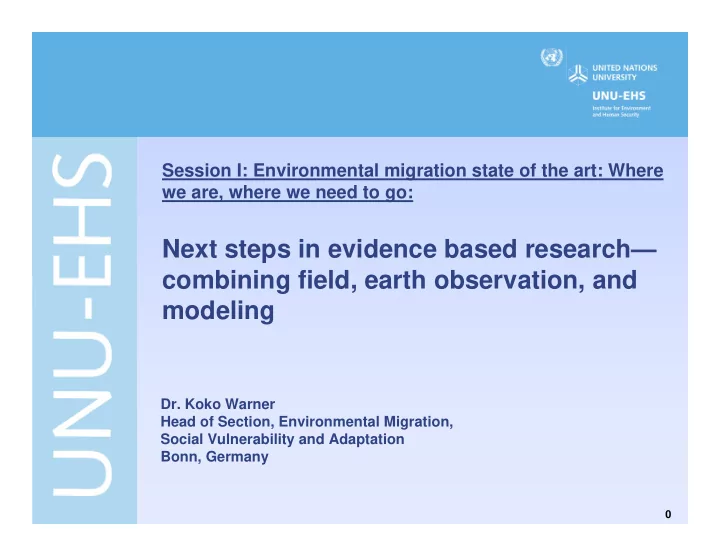

Session I: Environmental migration state of the art: Where we are, where we need to go: Next steps in evidence based research— combining field, earth observation, and modeling Dr. Koko Warner Head of Section, Environmental Migration, Social Vulnerability and Adaptation Bonn, Germany 0
Overview Research and policy context 1. Evidence based research on environmental 2. change and migration: lessons learned Next steps in research: combined evidence 3. based fieldwork with earth observation, modeling techniques, and mapping 1
Environmental change & migration: Thought Evolution • Early literature claimed direct, causal relationships Little consideration of household level, agency, intervening • social factors, context Academics debate Homer-Dixon´s hypothesis • Environmental wars did not materialize (no water wars, no • waves of environmental „refugees“…but localized tensions) Media and decision makers still thinking along these lines, • however • More recent debates have crystalized among „sceptics“ and „alarmists“ • Emerging evidence-based research (such as EACH-FOR project) gathering knowledge about models, nuanced relationships— with many questions about scale and generalizability! 2
3 Rockefeller Foundation Donor Briefing 23 September 2009, New York City warner@e
Rockefeller Foundation Donor Briefing 23 September 2009, New York City warner@ehs.unu.edu 4
5 warner@ehs.unu.edu
6 Rockefeller Foundation Donor Briefing 23 September 2009, New York City warner@e
7 warner@ehs.unu.edu
8 Rockefeller Foundation Donor Briefing 23 September 2009, New York City warner@e
Lessons learned from EACH-FOR and other field-based research g Need to understand dynamic human-ecological systems, rather than „simple“ causal relationships g Need to understand evolving relationships between social networks, ecological systems, and a variety of risk management measures including migration g Need to understand interlinkages between migration and environmental change over longer periods of time—out towards 2050, 2080… g Rich methodological lessons from fieldwork, scale issues, isolating variables, etc. 9
“In the long-term, this [changes in rainfall patterns and rising temperatures] will be a main driver of migration; but we haven't started thinking about it yet because its outside of what we have dealt with in the past. We are still stuck on the old drivers getting wider and worse." Bill Swing, Director General of IOM UNFCCC climate negotiations in Copenhagen (COP15) 10
• New initiative: “Where the Rain Falls: changing agro-climatic risks, hunger and human mobility“ • 36 month research project looking at links between agro-climatic risks, food and livelihood security, and human mobility • Principle investigators: UNU and CARE International • Supported by: • a North American foundation, • a European corporation (corporate social responsibility and data units) 11
Objectives & methods g Conceptualize relationship Household survey, n ≥ 4,000 g between changing rainfall g Participatory community-based patterns, food security, and research in 8 countries different forms of human mobility. Earth observation/GIS g techniques, rainfall variability over g Assess potential for changing time (NDVI, weather stations, rainfall patterns to become a etc.), t ≥ 25 years major driver of human migration and displacement within the next g Agent-based modeling [two/three decades]. Hotspot mapping, demographic g information, map layers g Enable range of stakeholders , including southern civil society organizations, to influence key Participatory community-based g policies and plans. adaptation and resilience building 12
13 warner@ehs.unu.edu
Thank you. Dr. Koko Warner Institute for Environment and Human Security (UNU-EHS) Hermann-Ehlers-Str. 10 D-53113 Bonn, Germany Phone: ++ 49 (0) 228 815-0226, Fax: ++ 49 (0) 228 815-0299 E-Mail: warner@ehs.unu.edu www.ehs.unu.edu 14 warner@ehs.unu.edu
Recommend
More recommend